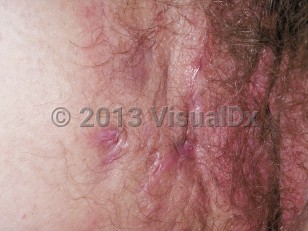Crohn disease in Adult
See also in: Anogenital,Oral Mucosal LesionAlerts and Notices
Important News & Links
Synopsis
Symptoms from Crohn disease can vary considerably, due to location but also to the severity of disease involvement. Patients may present with abdominal pain, bloody or nonbloody diarrhea, weight loss or malnutrition, fistulas, abscesses (often perianal), dysphagia, or oral ulcerations. Additionally, Crohn disease has many extraintestinal manifestations that can at times be the presenting symptoms. These manifestations can involve joints, skin, eyes, vasculature, the lungs, or the kidneys. Cutaneous and mucosal manifestations are described in more detail in Look For.
Chronic inflammation from Crohn disease can lead to fistula and stricture formation, which predispose to small and large bowel obstructions, infections secondary to fistula tracts, and malnutrition as a result of longstanding intestinal inflammation. These complications result in much of the morbidity from Crohn disease, highlighting the importance of achieving and sustaining deep remission as a primary goal of treatment.
Crohn disease presents most typically in the second to fourth decades of life, with a slight female predominance. While no clear genetic mutation is linked to the development of Crohn disease, there are many genetic mutations that are associated with Crohn disease. For unclear reasons, Crohn disease is more prevalent at higher latitudes and in certain patient populations, namely individuals of Ashkenazi Jewish descent and individuals of Northern European descent in the United States.
Crohn disease is a chronic disease with many pharmacologic options that can be used depending on the severity of symptoms and on radiographic and endoscopic findings. Many patients are able to achieve remission, although the disease is progressive in nature and characterized by disease flares.
Codes
K50.918 – Crohn's disease, unspecified, with other complication
SNOMEDCT:
34000006 – Crohn's disease
Look For
Subscription Required
Diagnostic Pearls
Subscription Required
Differential Diagnosis & Pitfalls

Subscription Required
Best Tests
Subscription Required
Management Pearls
Subscription Required
Therapy
Subscription Required
Drug Reaction Data
Subscription Required
References
Subscription Required
Last Updated:02/29/2024

